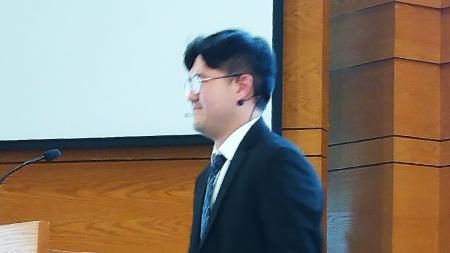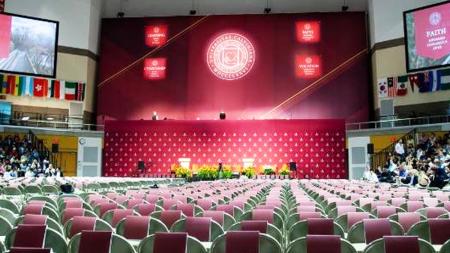CRC Executive Director Reflects on Experiences in Uganda

Steve Timmermans (back row on right), Barbara Nadunga (front row in middle) and entire class
Dr. Steven Timmermans says meeting Barbara Nadunga was among the many high points of his recent trip to Africa for the Theological Education in Africa Conference (TEA 2015).
Nadunga, principal of a church-linked Christian school in Entebbe, Uganda, attended his workshop on church, worship and disabilities.
She had polio as a child and the aftereffects challenge her ability to walk, said Timmermans, executive director of the Christian Reformed Church.
“As a member of my class, Barbara Nadunga provided great insight along the way,” said Timmermans, whose workshop was one of 16 at the conference in Kampala, Uganda.
“She spoke of challenges she has had to overcome, and focused on Psalm 139 — one of the passages I used in devotions as class began — as the turning point in her life. She said she, too, was ‘fearfully and wonderfully made’ as it says in the psalm,” Timmermans recalled.
Held from Aug. 17-21, the theme of the conference was “Worship, the Church and Theological Education in Africa.” About 300 delegates from some 250 African churches attended TEA 2015 for worship, prayer and leadership training.
“I was very impressed by the conference. I came away with many experiences and a strong sense of the CRC’s ministry in East Africa,” says Timmermans.
Overall, the conference drew delegates from 17 countries and four continents. More than 50 denominations were on hand and 20 theological institutions attended, said Rev. Mwaya Kitavi, chair of the conference and regional director for East and South Africa for Christian Reformed World Missions, which sponsored TEA 2015.
Kitavi said CRCNA institutions were well represented, including Calvin College, Calvin Seminary, the Calvin Institute for Christian Worship, Timothy Leadership Institute, World Renew and World Missions.
Several of the workshop facilitators, such as Timmermans, were from the CRC, said Kitavi.
“We had a full week of worship, fellowship, learning, unlearning, and relearning,” says Kitavi.
“Indeed God used all of us for his glory. One delegate sums up the entire conference this way: ‘One topic of worship was addressed from different angles yet in a unified manner, all of the speakers spoke in symphony.’”
Timmermans says he appreciated the chance to contribute to that symphony of voices.
In his workshop, he discussed the theological and psychological foundations encompassing what it means to be created in God’s image.
He also discussed ways in which disability is treated in Scripture and how important it is to include persons with disabilities in worship.
“I began with not just biblical insights, but by looking at the biblical narrative of creation, fall, redemption, restoration and how focusing only on ‘what's wrong’ (the fall) doesn't do justice to the fact that those with disabilities are created in God's image,” he said.
He said he wasn’t surprised by learning from people in his class that society, including churches, still tends to shun those who have disabilities.
But he at the same time, he said, he was pleased to discover that people in communities across Africa are “starting to understand that things need to change and more and more are including those who may have been forgotten in the past.”
In fact, he said, he received and email after TEA 2015 from Rev. Martin M. Wanjala, a pastor and General Secretary of the Christian Reformed Church in Eastern Africa, who said he found the workshop helpful and inspiring.
“I am putting in practice what you taught us on disability during the TEA. I have two cases of disability in the church. Pray with me that I become of help to them as I lead them to God,” he wrote.
While teaching the workshop and meeting people such as Barbara Nadunga and Wanjala were highlights of his trip to Africa, Timmermans said he also had the chance to meet with representatives from several denominations.
These denominations included the Sudanese Reformed Church, the United Reformed Church in Congo, and, although it is not in ecclesiastical fellowship with the CRC, the Pentecostal Assemblies of God Church.
“Being able to connect and meet with people from other denominations was interesting and a lot of fun,” he said.
Another highlight came after TEA 2015 when he toured the Pentecostal Assemblies of God’s theological college in Mbale, Uganda. CRWM is affiliated with the school and, along with providing teachers, has helped in a farming ministry.
“Pastors go to school to learn to be leaders of churches and they learn farming as a way to support themselves,” said Timmermans.
The CRC’s executive director also visited with CRWM missionaries and World Renew workers in a small community north of Soroti in North Uganda.
He said he learned of how the CRC has been involved in ministry and community development for years among people who have been displaced by war and persecution in this area.
He recalls sitting for more than three hours in a thatched-roofed building as the people from the community told stories and many offered thanks, through an interpreter.
World Renew, he said, has been in the area since the early 1980s, doing community development, and CRWM has been there for the last few years working in theological education and leadership formation.
“I heard person after person saying that we had been there at the right time, teaching and partnering with them,” he said. “I was impressed and deeply moved by what they had to say.”
Reflecting on his trip and experiences, Timmermans says he came away convinced that the focus of Christian missions has changed for the CRC in Africa.
“It is not about us bringing the gospel to the people and church in East Africa,” he said. “I saw that the people there are already on fire to spread the message and have the Spirit and commitment to do that.”
The role the CRC can and is already playing is to help equip members of the church in Africa to do ministry, from the pulpit to the community, even better, which is what the TEA 2015 conference and other efforts he saw in the field are all about.
“I was able to see the fruit of what the CRC has been doing,” he said. “I was able to see how the church is growing in Africa. It was exciting to see how the CRC has been able to come alongside leaders who are taking on the mantle of leadership so they can thrive in ministry.”


